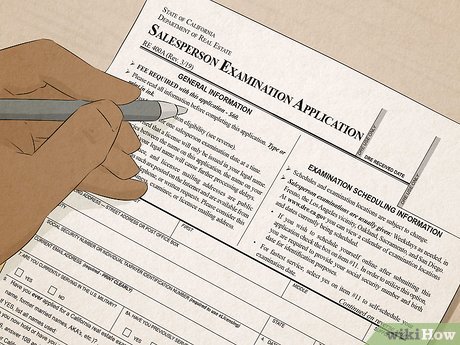
There is more to it than sitting for the exam if you just got your real estate license. You need to plan your future in real estate.
The most obvious step is joining a brokerage. This can be done either online or offline. As a member of a brokerage, you'll be able to establish relationships with other agents while also learning from experienced professionals. In addition, a broker can be a great mentor and help you head off any potential problems. They can also be a source of information on the local real estate market.
Trust is key in the real-estate industry. For instance, you may want to find an experienced broker who can teach you the ins and outs of real estate sales. This can be done through professional associations such as the National Association of Realtors. It is a good idea also to network with other members of the business such as lenders, real-estate agents, and title companies.

After you have obtained your license, the most important decision you'll make is to choose the right broker. A professional broker will be able to help you with the licensing process. You should ensure that they are qualified and have a working knowledge of the local markets.
Apart from joining a brokerage you should also consider enrolling in classes to increase your skills. You can take many courses online and in person. Most course providers offer boot camp style courses and fast track options. Some of these courses are completed in as little time as two weeks. Others can take up six months. Many students do their studies slower than others, which allows them more time to prepare for the final exam and get their supervising brokers in place.
A course in real-estate marketing is another option. This is a great way to get your name out there to potential buyers. Be sure to review the course's content and decide if it fits your needs. Also, make sure to look into the school's networking options. Getting to know the people in the industry can be a huge help in finding your next client.
An important consideration is the creation of a business program. A business plan is a great way to ensure you are on the right course, regardless of whether you are just starting or are an established professional. Be sure to include metrics that will allow you to track your progress.

While it may seem like a daunting task to obtain your real estate license, it is not that difficult. It is possible to realize your dreams with just a little bit of dedication and patience.
FAQ
Is it possible to quickly sell a house?
If you have plans to move quickly, it might be possible for your house to be sold quickly. However, there are some things you need to keep in mind before doing so. You must first find a buyer to negotiate a contract. Second, you need to prepare your house for sale. Third, it is important to market your property. You must also accept any offers that are made to you.
What's the time frame to get a loan approved?
It depends on several factors such as credit score, income level, type of loan, etc. Generally speaking, it takes around 30 days to get a mortgage approved.
What are the benefits of a fixed-rate mortgage?
Fixed-rate mortgages guarantee that the interest rate will remain the same for the duration of the loan. This means that you won't have to worry about rising rates. Fixed-rate loans come with lower payments as they are locked in for a specified term.
How do I eliminate termites and other pests?
Over time, termites and other pests can take over your home. They can cause serious damage and destruction to wood structures, like furniture or decks. A professional pest control company should be hired to inspect your house regularly to prevent this.
Statistics
- This seems to be a more popular trend as the U.S. Census Bureau reports the homeownership rate was around 65% last year. (fortunebuilders.com)
- Some experts hypothesize that rates will hit five percent by the second half of 2018, but there has been no official confirmation one way or the other. (fortunebuilders.com)
- 10 years ago, homeownership was nearly 70%. (fortunebuilders.com)
- This means that all of your housing-related expenses each month do not exceed 43% of your monthly income. (fortunebuilders.com)
- The FHA sets its desirable debt-to-income ratio at 43%. (fortunebuilders.com)
External Links
How To
How to Manage a Rental Property
Renting your home can be a great way to make extra money, but there's a lot to think about before you start. These tips will help you manage your rental property and show you the things to consider before renting your home.
This is the place to start if you are thinking about renting out your home.
-
What should I consider first? Before you decide if you want to rent out your house, take a look at your finances. If you are in debt, such as mortgage or credit card payments, it may be difficult to pay another person to live in your home while on vacation. Your budget should be reviewed - you may not have enough money to cover your monthly expenses like rent, utilities, insurance, and so on. It may not be worth it.
-
How much will it cost to rent my house? It is possible to charge a higher price for renting your house if you consider many factors. These factors include location, size, condition, features, season, and so forth. Remember that prices can vary depending on where your live so you shouldn't expect to receive the same rate anywhere. Rightmove reports that the average monthly market price to rent a one-bedroom flat is around PS1,400. If you were to rent your entire house, this would mean that you would earn approximately PS2,800 per year. That's not bad, but if you only wanted to let part of your home, you could probably earn significantly less.
-
Is it worthwhile? Doing something new always comes with risks, but if it brings in extra income, why wouldn't you try it? Be sure to fully understand what you are signing before you sign anything. You will need to pay maintenance costs, make repairs, and maintain the home. Renting your house is not just about spending more time with your family. Make sure you've thought through these issues carefully before signing up!
-
What are the benefits? Now that you have an idea of the cost to rent your home, and are confident it is worth it, it is time to consider the benefits. There are many reasons to rent your home. You can use it to pay off debt, buy a holiday, save for a rainy-day, or simply to have a break. You will likely find it more enjoyable than working every day. If you plan ahead, rent could be your full-time job.
-
How can I find tenants Once you decide that you want to rent out your property, it is important to properly market it. Start by listing online using websites like Zoopla and Rightmove. Once potential tenants reach out to you, schedule an interview. This will help you assess their suitability and ensure they're financially stable enough to move into your home.
-
What can I do to make sure my home is protected? If you are worried about your home being empty, it is important to make sure you have adequate protection against fire, theft, and damage. You'll need to insure your home, which you can do either through your landlord or directly with an insurer. Your landlord will typically require you to add them in as additional insured. This covers damages to your property that occur while you aren't there. If your landlord is not registered with UK insurers, or you are living abroad, this policy doesn't apply. In such cases you will need a registration with an international insurance.
-
It's easy to feel that you don't have the time or money to look for tenants. This is especially true if you work from home. However, it is important that you advertise your property in the best way possible. It is important to create a professional website and place ads online. It is also necessary to create a complete application form and give references. While some prefer to do all the work themselves, others hire professionals who can handle most of it. In either case, be prepared to answer any questions that may arise during interviews.
-
What happens once I find my tenant If there is a lease, you will need to inform the tenant about any changes such as moving dates. You may also negotiate terms such as length of stay and deposit. Keep in mind that you will still be responsible for paying utilities and other costs once your tenancy ends.
-
How do I collect my rent? When it comes time for you to collect your rent, check to see if the tenant has paid. If your tenant has not paid, you will need to remind them. After sending them a final statement, you can deduct any outstanding rent payments. You can call the police if you are having trouble getting hold of your tenant. They will not normally expel someone unless there has been a breach of contract. However, they can issue warrants if necessary.
-
How can I avoid problems? Renting out your house can make you a lot of money, but it's also important to stay safe. Make sure you have carbon monoxide detectors installed and security cameras installed. Make sure your neighbors have given you permission to leave your property unlocked overnight and that you have enough insurance. Finally, you should never let strangers into your house, even if they say they're moving in next door.